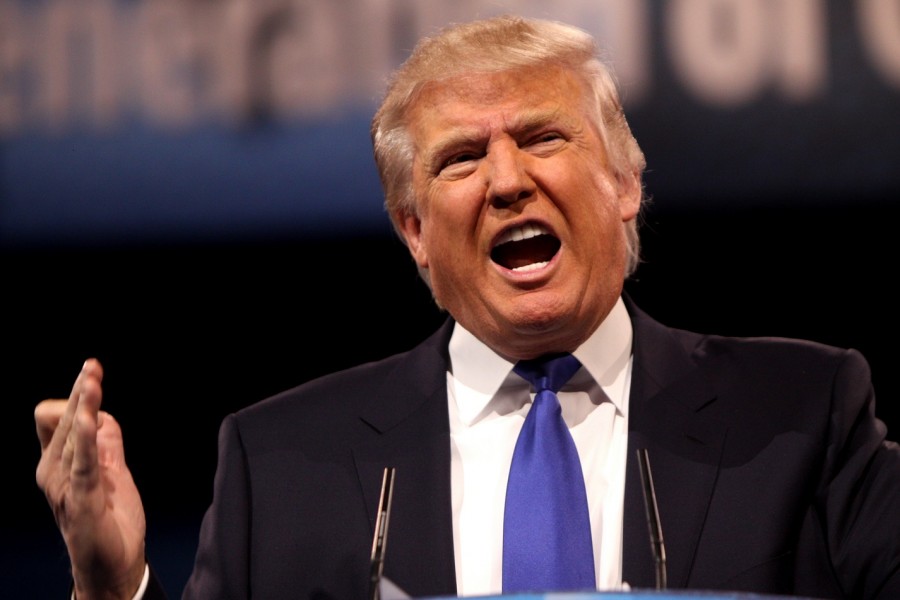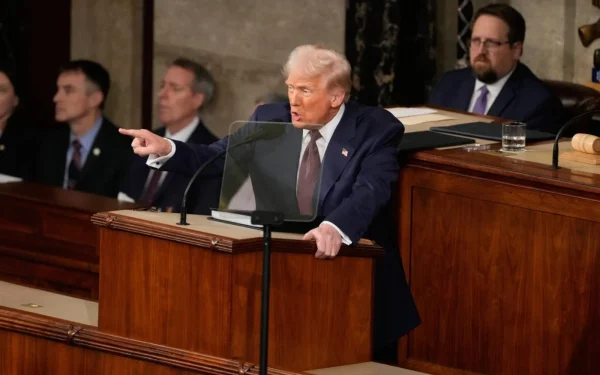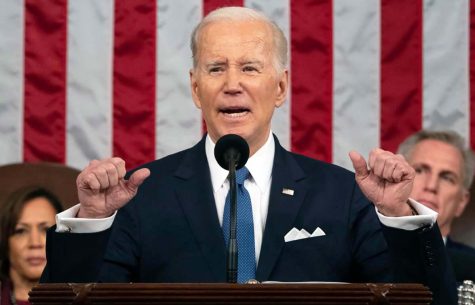Let’s talk about Trump–for real
Forget the jokes; it’s time for an actual conversation
Google image/Creative Commons license
A serious discussion may begin with a simple question: Is Donald J. Trump a fascist?
It’s no secret that Donald J. Trump is a popular topic of conversation these days. From lists of reasons to vote for him (or the many reasons not to) to articles posted about yet another “offensive”—or offensive, no qualifiers, take your pick—thing that he has said, Mr. Trump has taken over the media world.
Whether you’re a fan, or not, you can no doubt agree that the man knows how to get people in the country talking about him. Scratch that—people all around the world talking about him. So let’s talk about him. But maybe we should do it for real this time.
Can we put aside the jokes about his hair? The videos of him moving his face randomly titled “me trying to figure out this new Snapchat filter?” And please, for the love of all things right, can we stop the Adolf Hitler comparisons?
If we’re going to talk about Mr. Trump, let’s do it for real. Let’s cut the jokes and the insensitivity and take a look at cold, hard facts.
Columnist Ross Douthat of The New York Times recently wrote an article headlined “Is Donald Trump a Fascist?” In the article, Mr. Douthat discussed Italian author Umberto Eco’s list of 14 traits that are representative of fascism. Mr. Eco, who died on Feb. 19, was a true Renaissance man: novelist, essayist, literary critic, philosopher, and semiotician.
So who is Donald Trump? Is he the “New Furor” as the punning headline in the Philadelphia Daily News called him, or is he just someone who says mean things, but is insensitively compared to Hitler, a dictator who killed millions of people?
It would be easiest to define terms to determine the answer. The word “fascist” is usually used as an insult or a term to describe Hitler or fellow dictator Benito Mussolini of Italy, but Mr. Eco compiled a 14-point list of fascist qualities.
Mr. Trump seems to possess a frightening number of them.

Trump rallies have become increasingly chaotic and unpredictable.
In her article “Donald Trump is a fascist,” Slate writer Jamelle Bouie argued that Trump’s ideas manifest themselves in the following seven traits: a culture of action (particularly the irrationality of action for action’s sake); intolerance of criticism; fear of outsiders; celebration of masculinity; appealing to the frustrations of the lower-middle class; intense nationalism; and “popular elitism,” or a promise to all Americans that they’re citizens of the best nation in the world.
Mr. Trump celebrates aggressive masculinity and often mocks the weak and disabled. Several newspapers have reprimanded him for mocking The New York Times reporter Serge Kovaleski, who suffers from arthrogryposis.
Additionally, Mr. Trump, on numerous occasions, has expressed feelings of xenophobia and has stated his desire to keep foreigners out of America by building a wall along the Mexican border and having Muslim immigrants carry identification, as well as limiting or blocking Muslim immigration to the United States.
Mr. Trump constantly speaks out about how America loses to other nations and needs to “become great again” and step up and reassert itself as the world’s “top dog.” With his callous remarks to Latinos, his vacuous promises to completely destroy ISIS, and his pledge to torture foreign enemies and/or their families, it’s easy (and scary) to match Mr. Trump to Mr. Eco’s disturbing list.
What is most frightening, perhaps, is that we don’t even know exactly what Mr. Trump wants for this country. He avoids specifics and all we really see of him are his rude, and often racist, remarks and the fact that he appears to possess at least seven of the 14 traits of fascists, according to Mr. Eco, someone who extensively studied Mussolini and dictator Francisco Franco of Spain and should therefore know what he’s talking about.
The conclusion? As an electorate, we must continue to educate ourselves. It’s not enough to simply declare he will, without saying how, make America great again—the implication being that it somehow, somewhere, stopped being so. Give the American people actual solutions to actual problems.
The key to preventing a once-unthinkable American slide into fascism, which above all suppresses dissenting opinion and opposition, is a willingness to call out Mr. Trump—who may well be on his way to the Republican presidential nomination after key primaries tonight—on his distortions, falsehoods and, lately, the alarming violence at his rallies and his snarling stock response when protesters make their voices heard: “Get ’em out.”
Democracy demands participation, an exchange of ideas, and a willingness to be informed. Ultimately, it’s up to the American people. Analyze what our country needs, what the people need, and what our values truly are.
Then, cut the jokes. Cut the silly comparisons and the memes. And let’s talk about the issues for real.

If you asked Rebecca’s friends how they would describe her, they would probably say compassionate. She cares a lot about her friends, and always tries...







Alyana • Mar 16, 2016 at 8:56 am
It’s too true that so many people are content writing Trump off as a joke. during the beginning of his campaign many people saw him as an outlier, an anomaly that would eventually drop out of the race because, how could he ever actually win the nomination? With the Republican National Convention inching closer and closer, and Donald Trump maintaining his momentum and still in the lead, America needs to wake up. There are people out there who support Donald Trump, and there are enough of them to lead him to the nomination. It’s time to take him seriously, because he is a serious problem to many people. i’m tired of hearing jokes about him from people who don’t understand how dangerous he is.
Even Republicans and other conservatives have a reason to try and stop Trump. Prominent Republican leaders have already denounced Trump, such as Paul Ryan, who admits that he would begrudgingly accept Trump as the nominee. It’s important for the Republican Party to coalesce and figure out what it’s platform really is, and whether or not Trump fits into it. Senator Lindsey Graham has already stated that Trump isn’t a conservative, and having him as the head of the party would mean the loss of many elections. As it stands, projected general elections with Trump against Hillary Clinton or Bernie Sanders shows him losing. If the Republican Party really wants to win the general election, then their best choice isn’t Donald Trump. Key questions Republicans will have to answer in the following weeks: what does the Republican Party stand for? Does Donald Trump represent those ideals? If not, then who can the Republican Party rally behind? Even if they find someone, is it too late to stop Trump?
Nat • Mar 15, 2016 at 10:47 pm
Although I can see the sentiment in your argument, the people who vote for candidates like Donald Trump are not ones you can convince to further educate themselves: the ambiguity in Trump’s plan to “make America great again” is what drives his campaign. His supporters thrive off of the violence, racism and sense of supremacy that he encourages, and to re-educate these folks would be impossible. Trump, being the marketing genius that he is, found an audience composed of members that either live in the past, or are naive enough to believe he is the future of the US.